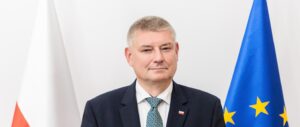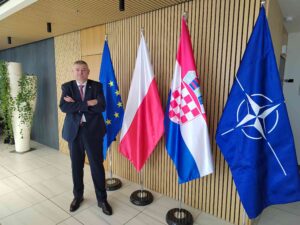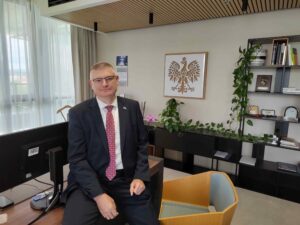In 2023, Poland placed sixth on the list of the largest exporters to the Croatian market.
Within the framework of the EU and NATO, the officials of Poland and Croatia lead state policies in the interests of citizens and jointly proclaimed values on which our modern states rest, says H.E. Paweł Czerwinski, Ambassador of the Republic of Poland to Croatia. The war in Ukraine, now also in the Middle East, constant crises in the world force us to cooperate more closely. Among other topics, for Diplomacy&Commerce magazine, we talked with the ambassador about the importance of the Three Seas initiative, but also about other important things that make a quality and satisfying work and life – economy, culture, tourism.

How would you rate the relations between the Poland and Croatia? Both are members of the EU, Schengen, NATO. It seems allies in all areas.
Exactly, this is what we are. Our relations are very good, friendly, free from any unanswered questions and have two equally important dimensions – bilateral and multilateral. We share similar views and ideas concerning the key issues within both the EU and NATO, which has been proven, for example, by the presence of Croatian soldiers in the Alliance’s Eastern Flank. I would also add the Three Seas Initiative to the list of areas in which Polish-Croatian cooperation is developed on an international level.
The Three Seas Initiative is also an important link between the two countries. How would you rate the results of this initiative and the role of Poland and Croatia?
The roles of Poland and Croatia in the Three Seas Initiative (3SI) are crucial, because our two countries were co-founders of this unique format of regional cooperation. In the beginning, in 2016, there was a lot of skepticism towards the 3SI in Europe, and this was the result of a misunderstanding of the very idea and goals of this project. Today, nobody denies the need for improvement of connectivity – in terms of transport, infrastructure, IT – on the North-South axis, as it is still underdeveloped in comparison with numerous bonds linking Western and Eastern parts of the European Union. And exactly this has always been and still is a strategic goal of the 3SI which was invented as a regional cooperation group within the framework of the EU. Of course, the achievements of the Three Seas Initiative could be greater, but one has to acknowledge the challenges it has faced during the 9 years of its existence. First we had the Covid-19 pandemic and then then war in Ukraine, and they both seriously affected the economies of all EU member states, and particularly of the Central and Eastern European ones. And with this in mind, we can proudly admit that the 3SI proved itself really resilient and flexible. The 3SI Summit held on April 11th in Vilnius, along with the accompanying Business Forum, allowed our cooperation to have an even stronger impact. I believe that Poland and Croatia will be able to contribute to the fulfillment of various ambitious projects proposed by our leaders.

The embassy also invests a lot in connecting the two nations through culture and education. What would you particularly emphasize from the activities in these fields?
Culture is an important element through which one can get to know the character and traits of a particular people. It is the soul in the body of every society. We at the Embassy aim to present various aspects of Polish cultural identity by organizing concerts, exhibitions, plays, film screenings, scientific conferences, and other events that we believe could be interesting and educational for the residents of Croatia. We particularly bring up Polish and Croatian ties which sometimes date back several centuries. For example, on the occasion of the 30th anniversary of the establishment of diplomatic relations between Poland and Croatia, we created a mural in the center of Zagreb dedicated to its former mayor, Adolf Mošinsky, who has Polish roots. Mošinsky changed the character of Zagreb at the turn of the 20th century. During his term in office, some of the most attractive sights of the city were built, such as the Croatian National Theater, the Mimara Museum, the Art Pavilion, and the Lenuci Green Horseshoe. Many roads in the so-called Lower Town were completed, as well as the road to Sljeme. Furthermore, the water supply and the sewer systems were constructed under Mošinsky. We also actively support the teaching of the Polish language at Croatian universities. We are proud that our mother tongue has many enthusiasts in Croatia, among whom there are excellent linguists and translators of Polish literature.
How do you evaluate the economic relations between the two countries? What do the numbers show (imports, exports, investments…)?
The value of trade turnover between Poland and Croatia is constantly growing. The trade balance is definitely favourable for Poland, but this is to some extent compensated by the expenditure of the numerous Polish tourists who visit Croatia (over a million every year). In 2023, Poland placed sixth on the list of the largest exporters to the Croatian market. That year, the value of Polish exports to Croatia amounted to €1.564 billion, and the value of imports from Croatia to Poland – to €562.9 million. I want to emphasize with great satisfaction that in 2023 our countries’ trade turnover exceeded the threshold of €2 billion for the first time in history, reaching a record high €2.126 billion. Polish companies such as LPP (the owner of the Reserved and Mohito brands), CCC, Emmezeta, and DrvoExport successfully operate on the Croatian market. The Enterprise Investors investment fund, which owns the Studenac supermarket chain and is well known to Croatian consumers, is constantly developing its operations. Polish capital is also behind the success of the PANPEK bakery chain. Another example worth mentioning is the Polish company Press-Glass, which has its glass factory in Varaždin. The adoption of the Euro, good economic results, and the absorptive capacity of the domestic market have had a positive impact on the investment climate in Croatia, which has also caught the eye of Polish entrepreneurs. Many of them contact the Embassy of the Republic of Poland in Zagreb, wanting to expand their activities to the Croatian market. From our correspondence with representatives of the Polish business community in Croatia, we also know that they greatly value their cooperation with the Croatian Chamber of Commerce.
Where do you see Europe and the EU in 10 years and what are the biggest challenges facing Europe that can threaten our values, way of life…? What are the biggest challenges?
It is very difficult to be optimistic in the current situation and I doubt anybody can predict what not only the EU but the whole world will look like in 10 years. A major challenge is Russia’s imperialistic policy due to which it did not develop good, partner relations with the Western world – and in fact, perceived all friendly gestures from the EU as a weakness. Apart from its aggression towards Ukraine, Russia poses a clear and present danger to European values, democratic institutions and, last but not least, our way of life. The Moscow regime not only despises international law and any civilised rules of conduct, but is also actively undermining Europe’s stability via various destructive actions, which in many respects is hybrid warfare. The usage of illegal migrants as a weapon, spreading large-scale disinformation, and supporting left- and right-wing extremists are only a few examples. Unfortunately, for a very long period of time, the warnings expressed by the Central and Eastern European Member States have been flatly dismissed and labeled as Russophobic. Now, we are paying a high price for such an attitude of leading European powers. But of course, we should not blame Russia for everything, as our European leaders have made many mistakes themselves. Many times there was too little understanding for the needs and feelings of common EU citizens. The resulting frustration has unfortunately caused a dramatic decrease of trust and respect not only towards specific institutions within the EU, but also towards its democratic procedures. This is the reason for growing support that many Eurosceptic and populist politicians enjoy right before the elections to the European Parliament. In order to survive, the European Union must return to its roots, and again be just and friendly towards its own people, regardless of their nationality, wealth status, or historical background. Let us hope that the upcoming European elections will open a new chapter and the EU will be able to resist all these threats, as well as finally play a role it deserves on a global level, achieving – in terms of political and economic might – a position of the power equal to the USA, China, Russia, or India.

How does official Warsaw view EU enlargement? In addition to the countries of the Western Balkans, there is also Ukraine and Moldova?
Poland has always been an unequivocal advocate of the “open door” policy and thus we support an enlargement process that should be fair, transparent, and merit-based. All serious European politicians have to understand that admitting the Western Balkans and Eastern Partnership countries is not an act of charity; rather, it has to be in the best interest of the Community itself. A clear and honest perspective of EU membership is an incentive to reform a country’s economy, strengthen its democratic institutions, and protect human and civil rights – so an incentive to take steps that improve the quality of citizens’ lives and contribute to peace and stability. And peace and stability in the immediate neighbourhood is undoubtedly of vital importance for the Union in all areas – economy, culture, security policy, etc. Our position towards the enlargement strategy is that there is no discussion which dimension is more important – southern or eastern – because the accession process is neither a beauty contest nor a question of some limit in the number of potential new members. We do not agree with the opinion that the admission of Ukraine or Moldova to the club would be done at the expense of the Western Balkan countries. Simply put, all who are willing to enter should have an equal chance to do so, without any bias from the EU. At the same time, it is understood that the aspiring and candidate states have to do their homework and meet all conditions presented during the accession negotiations. From the point of view of Poland, a country’s alignment with the EU Common Foreign and Security Policy (CFSP) is of particular importance in the present global situation.